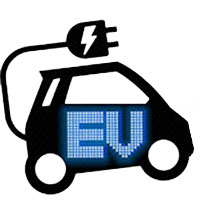Saturday, April 29, 12:30 – 3:30 p.m., County Parking Lot
— from Ryan T. Palmateer —
 Lower your carbon footprint in style at the Friday Harbor Electric Vehicle (EV) Car Show. Come check out a wide variety of electric vehicles, ranging from state-of-the-art to commuter specific, and even hand-built EVs. The 100 percent Kid-Built EV from STEM students of Friday Harbor High School.
Lower your carbon footprint in style at the Friday Harbor Electric Vehicle (EV) Car Show. Come check out a wide variety of electric vehicles, ranging from state-of-the-art to commuter specific, and even hand-built EVs. The 100 percent Kid-Built EV from STEM students of Friday Harbor High School.
San Juan Islands Conservation District will be having an Electric Car show on Apr. 29 in Friday Harbor from 12:30 – 3:30 p.m. after the Climate March.
The Event is 100 percent free to the public to come and check out some awesome EVs as well as other renewable energy booths from OPALCO, RainShadow Solar, and the Friday Harbor High school STEM Center 100% Kid Built Electric Vehicle. The public can speak with owners, EV dealers, take test drives find out about Local, State and Federal incentives.
We encourage anyone that already owns an Electric Vehicle or PHEV to come and show off their ride.
Come see why the San Juans are the perfect place to drive an EV. For more information, please call 360-376-6621, or email Ryan@SJICD.org
**If you are reading theOrcasonian for free, thank your fellow islanders. If you would like to support theOrcasonian CLICK HERE to set your modestly-priced, voluntary subscription. Otherwise, no worries; we’re happy to share with you.**









EV’s are great for their low cost of charging (fueling). It is far cheaper to buy OPALCO energy at $0.095/kwh that gasoline at $3.00/gallon to fill her up. So the economics of an EV is a big winner.
EV’s however loose on carbon footprint. They run on electricity. There is no spare clean hydro power sitting around just waiting to charge up your EV. Hydro power (or wind or solar) is the cheapest power around so it is all used up every day. No new hydro projects are coming on line. New wind and solar are coming on line and they serve to reduce fossil fuel generation (mostly coal).
So your EV must charge up on available generating capacity. That will be the high cost stuff that is not running full bore and that is COAL most of the time.
If you drive a gasoline powered car that gets 35mpg or more, your carbon footprint is already better than your LEAF (running on coal).
Actually, depending on the season, there is a lot of spare hydro available. There are in fact times when utilities have to be paid to TAKE power. Coal plants are pretty much on or off, and each on-and-off cycle for a coal plant is wearing on equipment that gets so hot, cools down and gets hot again. Coal plants are running less and less as base load, and more and more as supplemental supplies supporting wind (which in terms of U.S. capacity has just exceeded hydro capacity), hydro and solar.
More to the point, OPALCO’s power (hydro) comes from BC (via BPA). Its consumption does not result in someone else using coal, though elsewhere Tom Owens may have a valid theoretical argument. We are the exception to Tom’s argument and should make a point of taking advantage of it.
Coal plants are shutting down all over the country, one by one. The only reason they continue running is because the utilities that own them have to earn money to recover depreciation, which utility commissions let them do at the expense of ratepayers. Hydro is more controllable, but rivers must low and fish must swim. It’s wind that gets shut in times of excess. Coal plants are increasingly idled because their fuel (as Tom Owens points out) being more expensive than any other energy source, is the last resort.
Moreover, gasoline powered vehicles rely on an infrastructure based on a petroleum-based economy, the support of which requires not only unquantifiably immense amounts of carbon emissions and environmental damage but also wasted lives and treasure. Patronizing this economy enables this violation of human ethics toward other humans and the planet. Anyone who can afford an EV should make the change.
For those looking to learn more about the transition to electric vehicles, here’s a a good article just posted at Bloomberg:
https://www.bloomberg.com/news/articles/2017-04-25/electric-car-boom-seen-triggering-peak-oil-demand-in-2030s